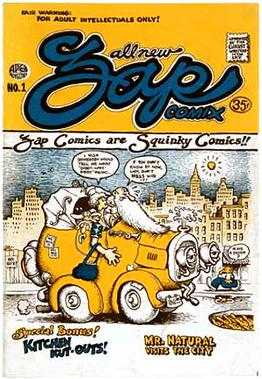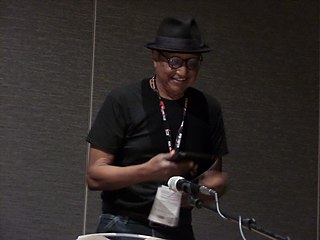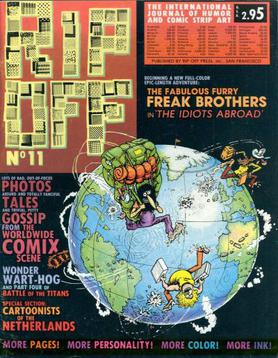Related Research Articles

Underground comix are small press or self-published comic books that are often socially relevant or satirical in nature. They differ from mainstream comics in depicting content forbidden to mainstream publications by the Comics Code Authority, including explicit drug use, sexuality, and violence. They were most popular in the United States in the late 1960s and 1970s, and in the United Kingdom in the 1970s.

The Disney animators' strike was a 1941 American film industry work stoppage where unionized employees of Walt Disney Productions picketed and disrupted film production for just under four months.

Kim Deitch is an American cartoonist who was an important figure in the underground comix movement of the 1960s, remaining active in the decades that followed with a variety of books and comics, sometimes using the pseudonym Fowlton Means.

Kitchen Sink Press was a comic book publishing company founded by Denis Kitchen in 1970. Kitchen Sink Press was a pioneering publisher of underground comics, and was also responsible for numerous republications of classic comic strips in hardcover and softcover volumes. One of their best-known products was the first full reprint of Will Eisner's The Spirit—first in magazine format, then in standard comic book format. The company closed in 1999.
Roberta Gregory is an American comic book writer and artist best known for the character Bitchy Bitch from her Fantagraphics Books series Naughty Bits. She is a prolific contributor to many feminist and underground anthologies, such as Wimmen's Comix and Gay Comix.

Floyd E. Norman is an American animator, writer, and cartoonist. Over the course of his career, Norman has worked for various animation companies, among them Walt Disney Animation Studios, Hanna-Barbera Productions, Ruby-Spears, Film Roman and Pixar.

Jay Patrick Lynch was an American cartoonist who played a key role in the underground comix movement with his Bijou Funnies and other titles. He is best known for his comic strip Nard n' Pat and the running gag Um tut sut. His work is sometimes signed Jayzey Lynch. Lynch was the main writer for Bazooka Joe comics from 1967 to 1990; he contributed to Mad, and in the 2000s expanded into the children's book field.

Rip Off Comix was an underground comix anthology published between 1977 and 1991 by Rip Off Press. As time passed, the sensibility of the anthology changed from underground to alternative comics.

Gary Hallgren is an American illustrator and underground cartoonist. Illustrations by Hallgren have been "commissioned by publications such as The New York Times, Men's Health, The Wall Street Journal, Mad, and Entertainment Weekly, among others."

Jay Malcolm Kennedy was an American editor and writer. The author of The Official Underground and Newave Comix Price Guide, he was a long-time editor at King Features Syndicate, eventually rising to the position of editor-in-chief.
Attitude: The New Subversive Cartoonists is a series of anthologies of alternative comics, photos and artists' interviews edited by Universal Press Syndicate editorial cartoonist Ted Rall. The books were designed by J. P. Trostle, news editor of EditorialCartoonists.com. Two sequels and three spin-off titles have been published to date. A group of cartoonists featured in the Attitude series formed the organization Cartoonists With Attitude in June 2006; the group has hosted slideshow and panel events around the United States to promote the series and alternative political cartooning. The New Labor Forum described the series as "filled with politically attuned graphic artistry."

Artie Edward Romero is an American cartoonist, animator, producer, director and publisher. He began his career in comic books at a young age in the 1970s, and now is best known for his animation work.
Robert Triptow is an American writer and artist. He is known primarily for creating gay- and bisexual-themed comics and for editing Gay Comix in the 1980s, and he was identified by underground comix pioneer Lee Marrs as "the last of the underground cartoonists."

Dan Steffan is an American cartoonist and writer who has contributed to both mainstream and underground publications for several decades.

Tom Sito is an American animator, animation historian and teacher. He is currently a Professor at USC's School of Cinematic Arts in the Animation Division. In 1998, Sito was included by Animation Magazine in their list of the One Hundred Most Important People in Animation.
Joyce Farmer is an American underground comix cartoonist. She was a participant in the underground comix movement. With Lyn Chevli, she created the feminist anthology comic book series Tits & Clits Comix in 1972.
Gary Edson Arlington was an American retailer, artist, editor, and publisher, who became a key figure in the underground comix movement of the 1960s and 1970s. As owner of one of America's first comic book stores, the San Francisco Comic Book Company, located in San Francisco's Mission District, Arlington's establishment became a focal point for the Bay Area's underground artists. He published comics under the name San Francisco Comic Book Company, as well as publishing and distributing comics under the name Eric Fromm. Cartoonist Robert Crumb has noted, "Gary made a cultural contribution in San Francisco in the late 1960s, through the '70s, '80s & '90s that was more significant than he realizes."
Theodore Richards was an American web designer and cartoonist, best known for his underground comix.
Events in 1937 in animation.
Events in 1913 in animation.
References
- ↑ "Jim Siergey". lambiek.net. Retrieved 2019-11-05.
- 1 2 3 4 5 6 "Art exhibit gives area residents 'Cultural Jet Lag'". Lansing Journal. 2019-05-28. Retrieved 2019-11-05.
- 1 2 3 4 Michael Limnios; Blog, View (2016-04-22). "American cartoonist animator Jim Siergey talks about the music, literature, underground comix and counterculture". Blues Network. Retrieved 2019-11-05.
- ↑ Hiskes, Jamilyn (2019-08-01). "Remembering Woodstock". Lansing Journal. Retrieved 2019-11-05.
- 1 2 3 Melanie Jongsma (2019-01-30). "What is 'nart'? You'll know it when you see it". Lansing Journal. Retrieved 2019-11-05.
- ↑ Disney, Walt (1954-01-01). "Educational Values in Factual Nature Pictures". Educational Horizons. 33 (2): 82–84. JSTOR 42922993.